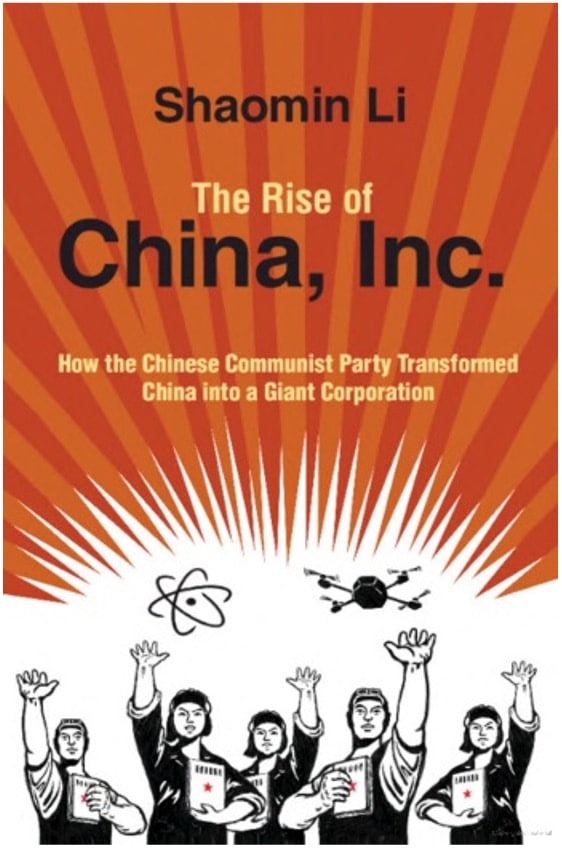ISBN 978-1-316-51387-3, Cambridge University Press, January 2022, 346 pages, $41.99 (paperback)
Reviewed by: Ian Murphy, SECURIFENSE, INC., Hendersonville, North Carolina, USA
The release of DeepSeek AI and subsequent controversy regarding its influence over democratic markets and societies can be seen as a natural extension of the Chinese Communist Party’s (CCP) transformation of China into a corporation-like entity, as detailed in Shaomin Li’s The Rise of China, Inc. This book is a meticulously researched and timely work that explores the intricate dynamics of China’s political, economic, legal, and cultural systems, shedding light on how the CCP has transformed the nation into an entity that acts more like a corporate firm than a country. Li’s central thesis is that the CCP’s unchecked power, coupled with its disregard for human rights, has allowed it to mold the country into a massive organization that operates with the agility of a firm and the vast resources of a state.
Li’s analysis begins by exploring the historical context of China’s transformation, highlighting how the CCP’s pragmatic shift towards capitalism in the late 1970s laid the groundwork for the country’s economic rise. However, this economic success has not been accompanied by a corresponding embrace of democracy or the rule of law as predicted. Instead, the CCP has consolidated its power, creating a unique system where the party-state reigns supreme. Central to Li’s analysis is the concept of “low human rights advantage,” a term he uses to describe how the CCP’s suppression of fundamental rights has enabled it to lower transaction costs and pursue economic growth with ruthless efficiency. Li contends that this disregard for human rights, coupled with the CCP’s control over the legal system, has created an environment where businesses and individuals are beholden to the party-state.
The historical turning point that led to the formation of the party-state was the combination of Mao Zedong and Deng Xiaoping’s legacies. Li argues that the period of Maoism, marked by radical communism and the erosion of property rights, instilled a “lawlessness” in mainland Chinese business culture that is not found in Hong Kong or Taiwan. This disregard for established norms paved the way for Deng’s era, where the mantra of “getting rich is glorious” was embraced without the safeguards of property rights and ethics. The fusion of Mao’s legacy of “anything goes” with Deng’s encouragement of rapid wealth accumulation created a unique environment where the pursuit of economic growth often triumphed over individual liberties and ethical business practices. This combination, Li argues, is the driving force behind China’s transformation into a corporate entity, where the CCP, like a CEO, directs resources and guides the actions of its subsidiaries, namely, the businesses and individuals within China.
Li’s analysis extends beyond China’s domestic landscape to the CCP’s global ambitions. The corporate structure, where CCP leadership acts as China Inc.’s CEO, likens state-owned firms to business units, private firms to joint ventures, and foreign firms to franchisees, all under the CCP’s ultimate control. Building on this corporate analogy, Li terms the CCP’s global strategy as “expansionary mercantilism.” This strategy is characterized by a willingness to use all means necessary to advance China’s interests, including bribery, propaganda, and coercive diplomacy. Li warns that this aggressive approach, combined with the CCP’s disregard for international rules and norms, undermines the political and economic systems of democracies. He emphasizes that democracies are ill-equipped to deal with such an adversary, as they are bound by the rule of law and democratic principles, which the CCP exploits to its advantage.
Given the CCP’s long-standing control over China, it is a surprise that foreigners still misunderstand China’s system. Li explains that foreigners frequently misunderstand China’s system due to their reliance on familiar frameworks and expectations, often overlooking the unique characteristics that differentiate it. They may assume that economic development will naturally lead to democratization and the rule of law, whereas the CCP maintains authoritarian control despite economic growth. The CCP’s Leninist nature means that it functions more as a clandestine organization with exclusive membership and societal control than a typical political party. Foreigners are also misled by the issuance of new laws and regulations, misunderstanding that the law in China functions as an instrument of state power rather than a guarantor of individual rights. The CCP’s efforts to present itself as a benevolent and responsible global actor, utilizing propaganda, united front work, and coercive diplomacy, further obscure its true nature and intentions. Understanding these unique characteristics of China Inc. is essential for an accurate understanding of China’s system and its implications for the world.
In the end, we are left with the anticipation that U.S.-China relations will be fraught with tension and competition in the coming years. The CCP’s grip on power and its global ambitions, coupled with its disregard for human rights and the rule of law, will continue to fuel friction and conflict with democracies. Shaomin Li predicts that the CCP will continue with expansionary mercantilism, leveraging its economic might and technological prowess to gain global dominance. This will likely involve further attempts to influence international organizations, acquire foreign technologies, and shape global narratives through propaganda and censorship. Li argues that the United States and other democracies will need to adopt a more assertive and unified approach to counter these challenges, which will involve a willingness to use coordinated economic sanctions, diplomatic pressure, and other measures to protect their interests and promote democratic values.
The emergence of DeepSeek is a significant development that can be linked to the broader picture of U.S.-China relations painted in the book’s conclusion. The development and application of DeepSeek AI’s technology raise a number of concerns about the CCP’s ambitions and its authoritarian practices, including the use of facial recognition technology to monitor and suppress ethnic minorities, cybersecurity threats against democratic nations, market exploitation, intellectual property theft by Chinese firms, and the internationalization of CCP propaganda and censorship. Using The Rise of China, Inc., we can see how the United States and other democracies need to develop a comprehensive strategy to deal with China that includes measures to protect human rights, promote the rule of law, and counter the CCP’s efforts to expand its influence overseas.
The Rise of China, Inc. is a must-read for anyone seeking to understand the complexities of China’s political economy and its implications for the world. Li’s work contributes significantly to the current literature on China’s political economy by offering a unique perspective on just how the CCP functions as a corporation, its methods of domestic control, its global ambitions, and what this means for global democracies. While Li’s assessment of the CCP is critical, his work is grounded in rigorous research and analysis, making it a valuable resource for scholars, policymakers, and business executives seeking to navigate the challenges posed by China Inc.
Ian Murphy currently works as a China Subject Matter Expert at SecuriFense Inc., where he helps organizations understand developments in China’s economy and foreign policy. He is currently a PhD student in International Studies at Old Dominion University.








